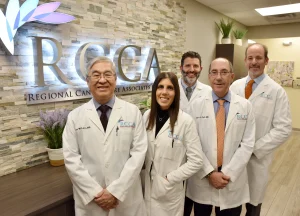
PSMA Therapy for Metastatic Prostate Cancer
A targeted, infused therapy that delivers radiation directly to cancerous cells has been shown to extend survival in many patients with metastatic prostate cancer. The
HIPAA Alert: Potential Data Breach Learn More
Questions on Oncology, Hematology and/or Infusion Clinical Services due to COVID-19 Crisis – CALL 833-698-1623
Important Information for Our Patients Regarding the Coronavirus.
RCCA Providing Area Cancer Patients with Access to Care During Coronavirus Outbreak
RCCA Offering Patients Virtual Visits During Coronavirus Pandemic
You’ve taken them for chicken pox and the flu. Now, you can receive a vaccination to prevent and treat select types of cancer at Regional Cancer Care Associates. Here’s a breakdown of what to expect from a cancer vaccine, the types that are currently available and the future of this medical breakthrough.
By definition, vaccinations involve injecting a microscopic quantity of mutated or weakened disease cells into the bloodstream. This is done to stimulate the immune system’s response via the production of disease-fighting antibodies so that when you come in contact with a certain disease, your body can successfully fight it off.
A cancer vaccine takes a slightly different approach, as it does not involve the injection of cancer cells into the body. However, it successfully triggers the immune system to attack and kill the cancer cells that already exist in the body.
According to some research, cancerous cells routinely form and are eliminated by the immune system, and tumors only form when the immune system is incapable of fighting off cancer cells. Therefore, cancer vaccinations have become widely accepted as an effective method of preparing the immune system to fight off cancer should the disease’s cells develop.
There are two types of cancer vaccines: cancer prevention vaccines, and cancer treatment vaccines.

As the name suggests, a preventative cancer vaccine, also known as a prophylactic vaccine, triggers the immune system to prevent certain viruses and infections that cause or contribute to the development of cancer. These are administered to healthy people with no signs of cancer.
Two types of preventative cancer vaccines are available. One is the human papillomavirus (HPV) vaccine, which is approved by the U.S. Food and Drug Administration (FDA) to prevent cervical, vaginal, vulvar and anal cancers, as well as genital warts. HPV can also cause oral cancers, though the FDA has not yet approved a vaccine to treat or prevent this type of cancer. The other preventative cancer vaccine is the hepatitis B vaccine, which is FDA-approved to prevent liver cancer.

As a type of immunotherapy for patients already diagnosed with the disease, cancer treatment vaccines, also known as therapeutic vaccines, aim to enhance the immune system’s natural capabilities to fight off cancer. These vaccines can consist of cancer cells, antigens or portions of cancer cells, allowing the immune system to recognize them as intruders.
There are currently two types of cancer treatment vaccines available. One is the Bacillus Calmette-Guérin (BCG) vaccine, an anti-tuberculosis vaccination that also is FDA-approved to treat bladder cancer. The other is Sipuleucel-T, which was designed to combat advanced prostate cancer with dosages customized on a patient-by-patient basis.
Recent advancements in cancer vaccines reveal a highly optimistic and promising future for their effectiveness as a treatment option for cancer. A study published in June 2019 found that the preventative HPV vaccine is delivering benefits beyond all expectations, such as the drastic reduction of precancerous cells in the cervix and lower rates of HPV-related illnesses.
Meanwhile, numerous cancer treatment vaccines are being extensively studied and researched in an array of clinical trials. These in-progress vaccines will target cancers that currently cannot be addressed with a vaccine, including:
If you have questions about the potential for cancer vaccines as part of your treatment plan, be sure to ask your doctor. He or she can explain which vaccines are available and relevant for your unique needs.
Whether you’re looking for another treatment option for your current cancer or are interested in a preventative vaccine, Regional Cancer Care Associates can help. We offer each FDA-approved cancer vaccine that is available now and will continue to bring the latest advancements in this emerging practice to our patients. For more information, contact RCCA today.

A targeted, infused therapy that delivers radiation directly to cancerous cells has been shown to extend survival in many patients with metastatic prostate cancer. The

Patients receiving treatment from Regional Cancer Care Associates in Moorestown are in good hands. Five of its physicians — Dr. Seth Berk, Dr. Maurice Cairoli, Dr.

The world of cancer treatment is rapidly evolving. New therapies are being discovered, and existing ones have improved, resulting in better patient outcomes. Regional Cancer

Regional Cancer Care Associates is one of fewer than 200 medical practices in the country selected to participate in the Oncology Care Model (OCM); a recent Medicare initiative aimed at improving care coordination and access to and quality of care for Medicare beneficiaries undergoing chemotherapy treatment.